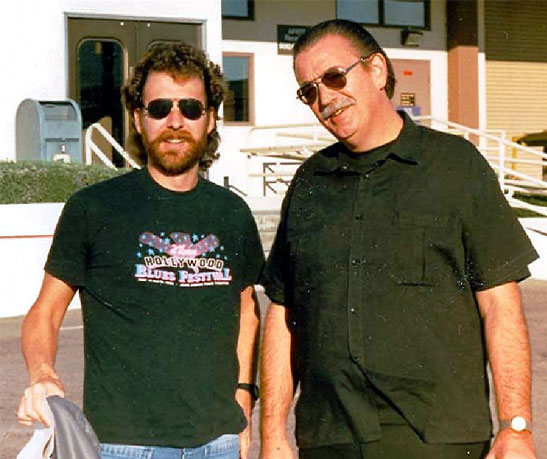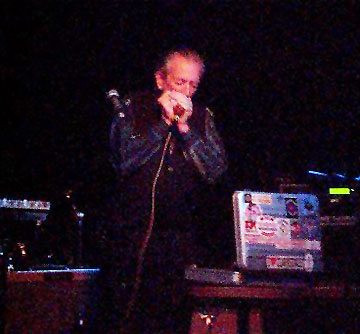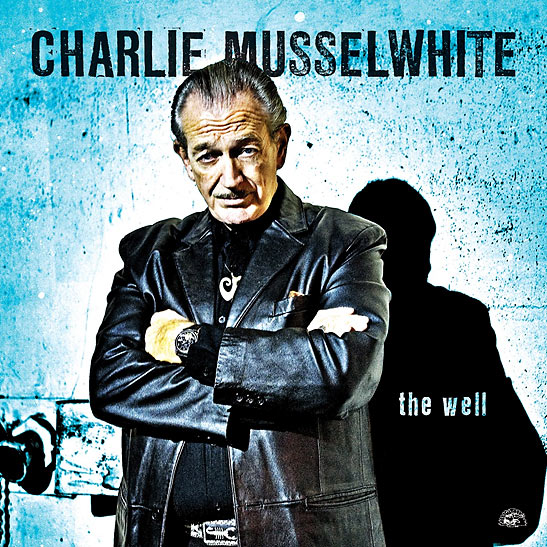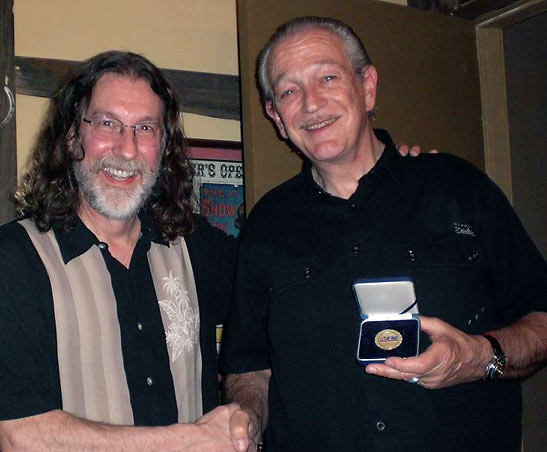 |
 |
|
 |

|
Charlie
Musselwhite…
With the family's move to Memphis, Charlie's exposure to blues would come first hand at the knee of local veteran bluesmen and musicians like Will Shade, Gus Cannon and Furry Lewis. "I would hang around their houses all the time; listen to the radio, the ballgame or something. All the musicians from that era knew Will (from his time with the Memphis Jug Band) and respected him. There would be spontaneous jam sessions and I would be playing right along, you know?
But America in the 1950's was changing at an incredible pace and thanks to Sam Phillips and his Sun Record Company, music was too. Memphis was about to become ground zero for something totally different. Charlie remembers, "The Killer was always around. Jerry Lee Lewis. I used to see him tearing up and down the streets. He had this orange and red convertible Lincoln." Charlie's smile grew as the memories flooded back, "I used to see Elvis. He would rent the Memphian Theatre after hours and show all the latest movies. And a whole bunch of Road Runner cartoons, because he loved the Road Runner. Sometimes he would rent the whole Memphis fairgrounds, from midnight to eight in the morning. All the rides would be free. People would just roam around and have a good time. He would speak; Say 'Hi' although I never talked to him about music or anything. But he recognized me as one of the group that hung around… Probably wondered how I got in there." (Laughs) When friends let Charlie know there were factories jobs in Chicago that paid $3.00 an hour. "WOW, man!" he shouted, "$3 an hour! I'd be a rich man if I could get a job like that. So, I went up there." After weeks of job searching, disappointment and very little money left, Musselwhite stumbled across a small 'help wanted' sign in a small extermination company. As fate would have it, those many hours of driving through Southside back streets and alleyways paid off as Charlie noted, "I'd pass a bar that had a sign on the front of it saying, 'Little Walter, Wednesday night.' I'd see all these places, write down the addresses and be right down there at night. Here were these people I'd been listening to and there they were! Man, it was such a thrill to walk in and see Howlin' Wolf for the first time. The power that he emanated was just awesome, and the band was just.... I was just slack-jawed. I couldn't even drink my drink. I was just glued into what was happening."
And much like his youth in Memphis, Charlie stood out
in most clubs on Chicago's Southside. "People would want to
know, 'Hey what are you doing in here?' I'd just say, "I came to
listen, I really love this music. When they found out I played, they'd
want me to sit in. After I'd sit in and they really liked it, people
started hiring me to play with them." This was life-altering
for Charlie Musselwhite. "Here I had a great future in exterminating,"
he laughs, "and just threw it all away to play harp."
Frequently finding himself across the stage from established players like 'Shakey' Walter Horton, Muddy Waters, Charles Edwards and Big John Wrencher, Charlie was gaining a wealth of experience and living a blues man's dream. "Five of us would stand there, shoulder to shoulder and just pass the harp back and forth, trying to out blow one another. It would be a real harp battle, all good-natured though." Charlie's admiration and appreciation of those fellow players remains to this day. "Shakey (Big Walter) Horton was just a monster. A lot of people don't realize what a good harp player he was." Some believe he influenced Little Walter tremendously, "only Little Walter was more business minded and got himself together." Charlie said. "Where Shakey would just as soon be out in the alley playing with his friends, drinking wine. He didn't give a damn about record companies. He'd done all that. He just played harmonica." * * * * * * * * * * * * * * * * * * * * Just this past December Charlie was in San Diego with a few friends to record a tribute to that other legendary harp player, 'Little Walter' Jacobs. But back in 1960's Chicago, Charlie said he found that the man was a lot different than his storied reputation and once Jacobs discovered that Musselwhite played, well that changed everything. "Walter would have me sit in and he'd often give me a ride home after the gig. He was always acting like he was looking out for me; I was a tough man, but we always got along fine." And since Charlie was establishing quite the reputation himself, he grins, "I was just having such a great time… I didn't give a damn. I was wild and drinking, but big enough to take care of myself. I never would back up from anybody! So right away they'd figure I was either crazy or not worth messing with." Charlie had a few hangouts, one was Rose and Kelly's Blue Lounge and he was a regular at Turner's Blue Lounge on Indiana Avenue. But when the subject of rough clubs or tough bars was mentioned, the name that came up most often was a place called the 'I Spy Lounge.' "Otis (Rush) said that was the roughest club he ever worked in." And Charlie added, "If Otis said it was the roughest, I tended to believe him. People always were in there, you'd see the bulge where their pistols were, people carrying butcher knives and stuff." Like almost all blues players of that era, Musslewhite and his buddy Big John Wrencher occasionally took their blues outdoors. "On Maxwell Street with Robert Nighthawk and Johnny Young," he remembers, "we'd take turns, whoever was playing the harp the other guy would walk around in the audience with a cigar box taking up tips. Then it would be my turn to play and he'd walk around and take up tips. He (Wrencher) was just a real good friend and we enjoyed playing together and sharing the stage together. He was a great guy and a good friend and I really miss him." A number of harp players and blues musicians played on Maxwell Street, the story goes that Snooky Pryor was the first to 'plug in' there. "I knew Snooky real well; I don't remember seeing him out there, though. Some say he was the first to play 'amplified' but the first Sonny Boy did too. I don't know who was first. Maybe nobody will ever know." In 1966 the road continued to beckon. After recording his first album, Musselwhite started receiving calls and music inquiries from the West Coast. At the time, he was married, had one child and a steady daytime job in a Chicago area factory. The offer was one Charlie just couldn't refuse. "I got off the plane in California. It was sunny, people were nice…they were smiling at you, friendly and courteous." He's shaking his head, "I didn't believe such a place existed. I called my wife and said, 'you better come on out here because I'm not coming back." (laughs) "The first place I played was the Fillmore and 'Wow, it was like working in an airplane hanger.' I'd never seen so many people at one time, and they were all so nice, throwing flowers at you. It was a whole new scene and I stayed." Laughing, Charlie adds, "And I've been working ever since." The migration from the frigid shoreline of the Windy City to San Francisco's 'Summer of Love' was like moving to another world. "It was really a culture shock," Charlie said, "The free love and people wearing flowers in their hair. I used to go down (to Haight Street) and just watch these weird looking people walking around in these weird clothes, and these weird hairdos." Being relatively normal looking and mostly clean cut, Charlie said, "People would come up to me and say, 'You're Charlie Musselwhite?' I'd say yeah and with a look of amazement they'd just shake their heads and say, 'I didn't know you were... Straight!'" No matter what his bent, timing couldn't have been better for Charlie. The Blues and those who played them were being rediscovered by a whole new generation. The Summer of Love was fast becoming the ultimate creative musical environment. "Janis Joplin was around. We hit it off great, because she liked to drink like I did. We had some real good times together. Meeting different musicians that I'd never met before and playing different kinds of music." Smiling, Charlie adds, "It was just great times, you know?" The 'great times' along with the years and miles would take a heavy toll on Charlie's friends. Some paid dearly, some permanently, and Charlie had his own pedal to the floor. But a single, nationwide news event brought him back from the crossroads; an epiphany that he would eventually write about and record. He spoke about the song, 'The Well.' "I'd been drinking REALLY heavy! And one day I realized, 'this is crazy.' I'd been drinking about two quarts of liquor a day. I drank every second I was awake. And it got to the point to where no matter how much I drank, I just didn't feel good. That old glow that I used to get, that old happy 'let's party' glow was just unreachable. I was just drinking to keep from getting sick, 'cause if I quit drinking, I got sick. So I thought, 'how am I gonna' get out of this?' I felt trapped. So I thought, well I'll just start cutting down. So every day I'd wait a little bit later before I had my first drink. I remember getting all the way up to noon without a drink and I thought, 'that calls for a drink!'" (laughing) "So eventually I didn't drink at all except when I went to work. I'd never been on the stage sober. And coming up, everybody I knew drank. All those guys drank. And it suited me because, I'm not a real extrovert, I don't really like being out in front of people. I love the music and I had to play the music, but I was uncomfortable on a stage with the thought of people looking at me. But if I was drunk… everything was A-l-r-i-g-h-t!!!
But I realized I had to get up there without drinking and I was wondering how I was going to do that. This was my last hurdle in my quitting drinking. I'm on my way to work and I'm listening to the news. I hear about this little girl named Jessica McClure, she fell in this well in Texas. And she's down in the bottom of the well, in the dark, with a broken arm and they've lowered a microphone and a speaker down so they can communicate with her… She's in a real fix, a life and death situation. Suddenly my…what I perceived as a problem seemed like it was about (holds up a pinched thumb and forefinger) that big. Why in the world couldn't I just get up on stage and do something I know perfectly well how to do… What's the PROBLEM? Also she was so brave; she was singing nursery rhymes to herself. And I was so moved by her bravery and I thought, you know, I felt like an idiot compared to her. I mean she's just a little girl, I'm a grown man… what am I whimpering around about? So I said, 'that's it. I'm not drinking till they get her out of the well.' Didn't say I was gonna' quit, I just said as a prayer for her, I wasn't going to drink till she was saved. Well it took 'em about three days and by then, I was out of the well too! And I remember thinking like, 'Wow, what was that all about?'" (laughing) "You know? It just seemed like the whole career in alcohol had been so unnecessary. And thinking about quitting drinking was actually harder than just quitting. My brain… your brain comes up with all these reasons, for me anyhow I feel like I got my brain and my mind, and they're kinda' hard to tell apart sometimes. Which one is the real one? His public exorcism of demons was probably the reason 'The Well' struck such a chord with blues fans… 'The Well' received a Grammy nomination and won multiple Blues Music Awards. Charlie is quick to add, "I'm public about it because, even though I think AA is great vehicle for people to be able to quit drinking, I was drunk in public for so long it's kind of silly for me to be 'anonymous' about it. So I'm out front about it and hopefully I inspire other people to quit and often people come to me to talk about it and I'm always glad to talk to them about drinking." While on the subject of 'The Well' you recorded Sad and Beautiful World with Mavis Staples. "Mavis is a real close friend and we've all stayed in contact. Mavis and I email often and so she's just a good friend. And I've ALWAYS loved their (the Staples) music, before I ever met them; because there's so much depth and so much substance... and the feeling, it's all right from the heart. So I thought she'd be perfect for that tune. I mean, who better? Nobody better." When you look at Charlie's journey to date, from the Mississippi Delta to the White House, it's almost impossible to find a musician that he hasn't performed with… from blues greats Muddy Waters, both Big Walter Horton and Little Walter Jacobs, John Lee Hooker, Bonnie Raittt and the Blind Boys of Alabama… the list is endless. Then when you scan the Rock and Roll collaborations… Charlie shared either a stage or studio with everyone from Mick Jagger and Eddie Vedder to Tom Waits and Cyndi Lauper… then there's a tune called 'Suicide Blonde' by INXS… Charlie just laughs, "Well, I didn't even know who they were, I'd never heard of them. I was doing a tour of Australia and I get this call in my hotel room and they say, 'we know you're coming to Sydney and we'd like for you to come by the studio and record a few tunes with us. And they say the name of the band was INXS. I said, 'yeah sure, I've got a day off, I'll come in. I get off the phone and say, 'who's INXS?' It turns out they'd only sold like 15 MILLION records! And I went to the studio and they were really nice people, just the nicest folks. Really nice guys, so we had a lot of fun in the studio." The man refuses to be pigeon-holed. "To me it's interesting to see how I can put blues into a situation that's not thought of as blues… and kind of… make it better!" (laughing) Speaking of collaborations, Charlie was part of the Big Head Blues Club and the '100 years of Robert Johnson' tribute. "Yeah, one tune was with me and 'Honeyboy' Edwards. Honeyboy's timing is erratic, he'll just change when he wants to, but I learned from playing with all those country guys, especially like Big Joe Williams, to anticipate. I could feel the change coming. You don't have to count bars or nothing. You just feel it, because it's all right from the heart. So I was really happy to play with Honeyboy because he was always sayin,' 'You can't follow me… nobody can follow me.' I said, 'Honeyboy, you KNOW I can follow you, 'cause I could follow Big Joe. And Big Joe was the first guy that took Honeyboy on the road, and the first guy that took ME on the road. So we have this connection. And I played some songs with the band too, so we had fun."
What about the tour you did with Hot Tuna bandmates Jorma Kaukonen and Jack Casady? "You know there's that saying that if you remember the sixties you weren't really there. Well I came out to San Francisco from Chicago in '67 and was immediately in that whole scene and I know I met them many times at this place and that place, the Golden Gate Park and the Fillmore and the Avalon. And over the years we continued to cross at different festivals and things like that so this tour they asked me and I suggested Jim Lauderdale and thought that would make a great mix of rock, country and blues." I'd heard that each show featured two sets, "one sitting down, sort of a semi-acoustic one the other one standing up and Rockin'! Charlie admitted, "I'm even playin' a little guitar on one tune." If the man isn't busy enough, he has his own radio show on KRSH, the KRUSH in Northern California. "It's just stuff I have laying around; it's not JUST a blues show, there IS some blues, but anything that I like that I find interesting. And I don't play anything most people have probably ever heard before, real obscure stuff. And I hope I can turn them on to things, you know? So I have fun with it and I call it 'Charlie's Backroom.'" After all these years where does your energy come from? "I don't really have a choice," (laughing) "it's what I do. Well, I tell you if I won the lottery" (laughing) "I wouldn't back out of my driveway until I REALLY felt like it and I wouldn't go anywhere unless I wanted to go there." Lucky for us there are still places Charlie Musselwhite WANTS to go. He headlines the AimLoan.com San Diego Blues Festival Saturday, Sept. 7, 2013. If you need a sneak preview on what to expect, check out the new duet release, 'Get Up!' with Charlie and Ben Harper or Blind Pigs 'Remembering Little Walter' that features Charlie, Billy Boy Arnold and Mark Hummel. Both recordings released this year will give you insight into the amazing talents of Mr. Charlie Musselwhite. For the complete lineup at this year's San Diego Blues festival go to http://sdbluesfest.com/. And don't forget to bring at least two can goods to benefit the Jacobs & Cushman San Diego Food Bank. It's always a great blues day on the bay. Related Articles: |
|
|
This site is designed and maintained by WYNK Marketing. Send all technical issues to: support@wynkmarketing.com
|

|




























